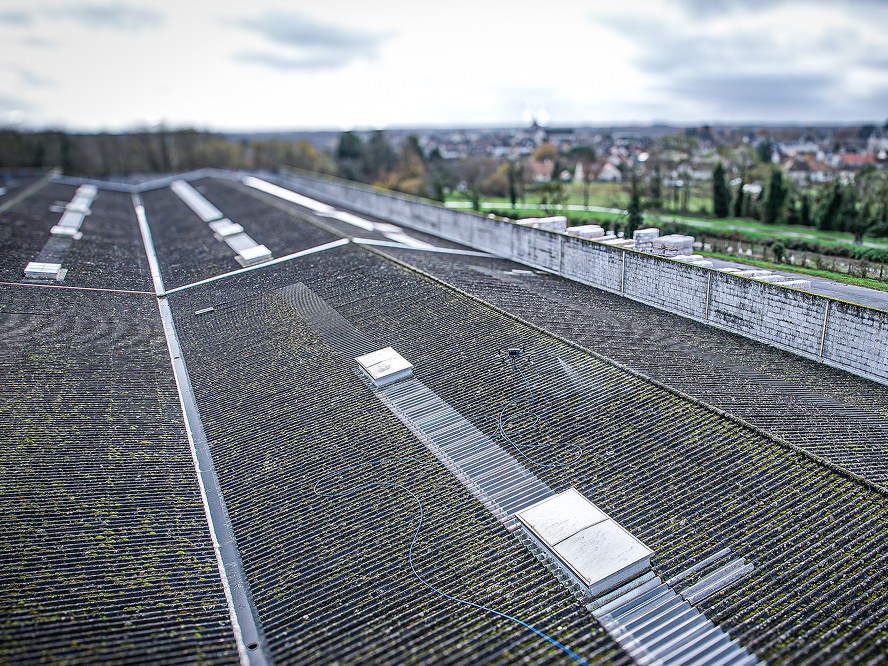customer case
Industrial buildings

Details of
the service
Renovation of an Asbestos Roof of 27,000 m² in Selles-sur-Cher: A Major Project Conducted by Drone
A Technical Challenge on an Asbestos Fibre-Cement Roof
FlyRenov recently undertook a large-scale project at 27 Rue du Bas Bourgeau, in Selles-sur-Cher (41), concerning the cleaning, fungicidal treatment, and painting of an asbestos fibre-cement roof of 27,000 m². This complex project required an expert approach, combining safety, speed, and efficiency, particularly thanks to the use of our specialised drones.
Thanks to this innovative approach, we optimised the intervention time while preserving the integrity of the roof and the workers, and this, in total compliance with environmental protocols.
This project is a clear example of the advantages of drone maintenance in complex conditions, offering a modern, faster, and safer alternative to traditional cleaning and renovation methods.
An Intervention in Several Stages
Phase 1: Fungicidal Treatment
The first stage of the project involved cleaning and sanitising the roof by removing moss, lichens, and other organic residues. A fungicidal treatment was applied for both curative and preventive action, ensuring lasting protection against micro-organisms and extending the lifespan of the covering. Thanks to the drone intervention, we treated 27,000 m² of roof in just a month and a half, safely.
Thanks to the drone intervention, we treated 27,000 m² of roof in just a month and a half, safely.
Phase 2: Moss Collection by Rover
To make the operation even more efficient, we deployed innovative technology from our R&D division: an autonomous rover designed to collect already dead moss. Installed before the painting phase, this device ensures meticulous collection and optimally prepares the surface for subsequent treatments. Thanks to this innovative approach, we significantly reduced intervention time while preserving the integrity of the roof and strictly adhering to environmental and safety protocols.
Phase 3: Painting Scheduled for Late April 2024
The second phase of the project, scheduled for late April 2024, will involve applying a protective paint in two stages:
Applying a primer coat to ensure optimal adhesion
Applying two coats of white paint, providing enhanced protection and a uniform aesthetic finish.
An Optimised Organisation for a Large Asbestos Project
This project involved the mobilisation of two teams of drone pilots, who worked 5 days a week to ensure smooth and safe progress of the work. To ensure optimal control during the moss removal, our drone pilots operated from secure platforms, allowing them to maintain continuous oversight of the intervention.
Thanks to this method, the entire roof was treated in just a month and a half, a significantly shorter timeframe than traditional methods, which are longer and riskier for operators.
Thus, no direct intervention on the roof was necessary, which preserved its integrity while strictly adhering to the safety protocols related to asbestos. This method not only ensured the safety of the operators but also maximised the effectiveness of the treatment of the roof.
Thanks to this method, the entire roof was treated in just a month and a half, a significantly shorter timeframe than traditional methods, which are longer and riskier for operators.
Drones Serving Industrial Infrastructure Maintenance
This project marks an important milestone for FlyRenov, as it is our first major project on an industrial building. It demonstrates once again the effectiveness and reliability of cleaning and renovation by drone, even on large surfaces and sensitive structures like asbestos roofs.
Thanks to this technology, we offer building managers a faster, safer, and less intrusive solution, limiting risks associated with working at height and reducing disturbances to the site's environment. This project also illustrates our ability to adapt to all challenges, whether they concern residential buildings, tertiary buildings, or complex industrial infrastructures.
FlyRenov thus confirms its positioning as a key partner for the renovation and maintenance of facades and roofs, regardless of site constraints.






